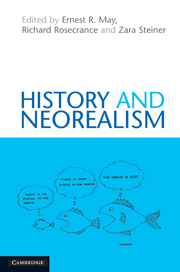
-
Select format
-
- Publisher:
- Cambridge University Press
- Publication date:
- June 2012
- September 2010
- ISBN:
- 9780511778551
- 9780521761345
- 9780521132244
- Dimensions:
- (228 x 152 mm)
- Weight & Pages:
- 0.78kg, 406 Pages
- Dimensions:
- (228 x 152 mm)
- Weight & Pages:
- 0.65kg, 406 Pages
You may already have access via personal or institutional login
Book description
Neorealists argue that all states aim to acquire power and that state cooperation can therefore only be temporary, based on a common opposition to a third country. This view condemns the world to endless conflict for the indefinite future. Based upon careful attention to actual historical outcomes, this book contends that, while some countries and leaders have demonstrated excessive power drives, others have essentially underplayed their power and sought less position and influence than their comparative strength might have justified. Featuring case studies from across the globe, History and Neorealism examines how states have actually acted. The authors conclude that leadership, domestic politics, and the domain (of gain or loss) in which they reside play an important role along with international factors in raising the possibility of a world in which conflict does not remain constant and, though not eliminated, can be progressively reduced.
Reviews
‘This book by three eminent scholars is audacious in its hope: since history shows that nations do not always obey the rules of pure power politics, a world of consent and cooperation is possible – and ever more likely. They buttress their case with a wealth of data from the American, European and Asian experience, presenting an original synthesis of history and theory that has become far too rare in the field of international relations.’
Josef Joffe - Senior Fellow, Freeman-Spogli Institute for International Studies, Stanford University
‘Richard Rosecrance, Zara Steiner, and the late Ernest May, along with other notable contributors from the field of international relations, have assembled a stunning and provocative attack on what they believe to be the reductionist hegemony of neorealist theory. It will unleash a terrific debate and deserves a place on every reading list in international politics.’
Charles S. Maier - Leverett Saltonstall Professor of History, Harvard University
‘A first rate team of scholars convincingly and overwhelming demonstrates that there is more – vastly more – to international relations that has been dreamt of in 'realist' philosophies.’
John Mueller - Ohio State University
Contents
Metrics
Altmetric attention score
Full text views
Full text views help Loading metrics...
Loading metrics...
* Views captured on Cambridge Core between #date#. This data will be updated every 24 hours.
Usage data cannot currently be displayed.
Accessibility standard: Unknown
Why this information is here
This section outlines the accessibility features of this content - including support for screen readers, full keyboard navigation and high-contrast display options. This may not be relevant for you.
Accessibility Information
Accessibility compliance for the PDF of this book is currently unknown and may be updated in the future.


